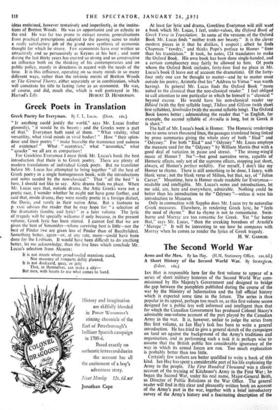Greek Poets in Translation
Greek Poetry for Everyman. By F. L. Lucas. (Dent. 16s.) " IF anything could justify the world," says Mr. Lucas (rather gloomily), " it would be its beauty ; and the Greeks were a part of that." Everyman hath need of them. " What vitality, what versatility, what vivid minds in vivid bodies! " How " their splen- dour and their poetry " " make bearable the transience and sadness of existence! " What " eccentrics," what " neurotics," what "quacks" we all are in comparison!
For Greekless Everyman I must think Mr. Lucas's book the best introduction that there is to Greek poetry. There are plenty of modern translations of individual Greek poets. But no translator before Mr. Lucas has attempted to bring together " all the best of Greek poetry in a single homogeneous book, with the introductions and notes needed by the non-classical." That "all the best " is here, I should not like to say. Attic drama finds no place. When Mr. Lucas says that, outside drama, the Attic Greeks were not a poetic race, I wonder whether he might not have gone further, and said that, inside drama, they were mostly poetic in a foreign dialect, the Doric, and rarely in their native Attic. But a footnote to p. xxxi advises the reader that he may hope for " a selection of the dramatists (iambic and lyric) " in a later volume. The lyric of tragedy will be specially welcome if only because, in the present volume, Greek lyric has been stinted. I cannot feel that we are given the best of Simonides—whose surviving best is little—nor the best of Pindar (we are given less of Pindar than of Bacchylides). Something better, again—or, at any rate, more—could have been done for the Lesbians. It would have been difficult to do anything better, let me acknowledge, than the five lines which conclude Mr. Lucas's selection from Alcaeus: It is not streets where proud-roofed mansions stand, Nor masonry of ramparts deftly planned,
It is not dockyard, quay, or jetty That, in themselves, can make a city—
But men, with hearts to use what comes to hand.
At least for lyric and drama, Greekless Everyman. will still want a book which Mr. Lucas, I feel, under-values, the Oxford Book of Greek Verse in Translation. In some of the versions of the Oxford Book Mr. Lucas finds " neither truth nor beauty." It is the clever
modern pieces in it that he dislikes, I suspect ; albeit he finds Chapman " tawdry," and thinks Pope's preface to Homer " finer than his translation." It took, he notes, 124 translators to make the Oxford Book. His own book has been done single-handed, and a certain complacency may fairly be allowed to him. Of poets whom the Oxford Book includes, forty-four find no place in Mr. Lucas's book (I leave out of account the dramatists). Of the forty- four only one can be thought to matter—and he to matter most outside his poetry, Aristotle (but his" Address to Virtue " was worth having). In general Mr. Lucas finds the Oxford Book " more suited to the classical than the non-classical reader." I feel obliged
to call attention to one particular in which he himself is " classical " beyond excuse. He would have his non-classical reader say Hesiod (with the first syllable long), Thltsos and GOcon (with short first syllables), Simanides (with the second syllable long). The Oxford Book knows better ; admonishing the reader that " in English, for example, the second syllable of Arcadia is long, but in Greek it is short."
The half of Mr. Lucas's book is Homer. The Homeric renderings
run to some seven thousand lines, the passages translated being linked by prose summaries giving the whole story of both " Iliad " and " Odyssey." For both " Iliad " and " Odyssey " Mr. Lucas employs the measure used for the " Odyssey " by William Morris (but with a good deal of variation in pause and stress). "The strong-wing'd music of Homer ? No "—but good narrative verse, capable of Homeric effects, only not of the supreme effects, stopping just short, always, of Homer's perfect nobility. For myself, I don't like my Homer to rhyme. There is still something to be done, I fancy, with blank verse ; not the blank verse of Milton, but that, say, of " Julius Caesar." Meantime, here is Homer made readable for Everyman— readable and intelligible. Mr. Lucas's notes and introductions, let me add, are, here and everywhere, admirable. Nothing could be better than his introduction to the " Odyssey "—unless it were his introduction to Musaeus.
Only in connection with Sappho does Mr. Lucas try to naturalise Greek measures. Elsewhere, in rendering Greek lyric, he " feels the need of rhyme." But to rhyme is not to romanticise. Swin- burne and Murray are too romantic for Greek. Yet " far better that," says Mr. Lucas, "than the creaking boredom of Arnold's Merope '." It will be interesting to see how he compares with Murray when he comes to render the lyrics of Greek tragedy. H. W. GARROD.






































 Previous page
Previous page